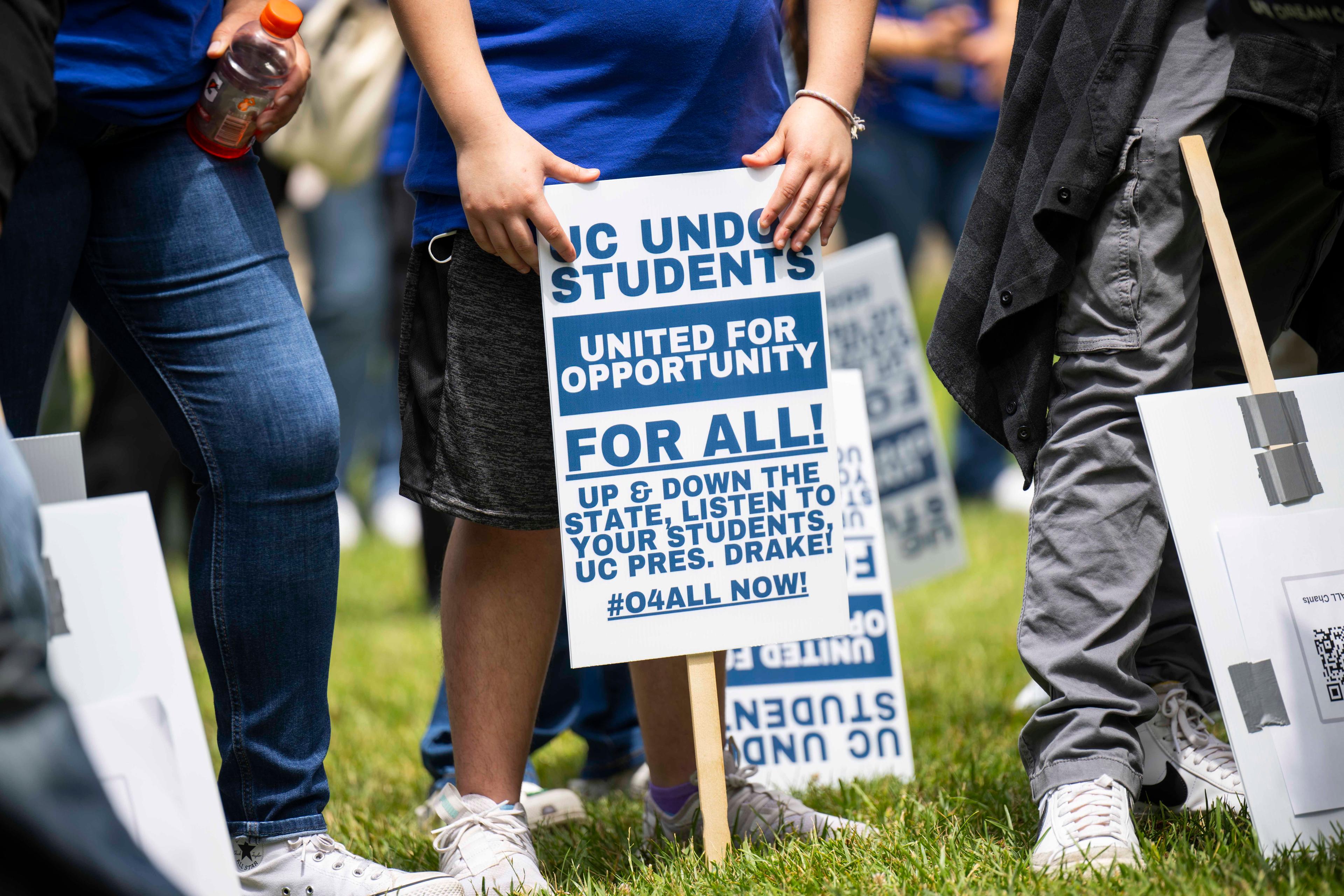Statewide campaign seeks employment opportunity for undocumented students
Protestors hold posters in support of the Opportunity for All campaign. The campaign seeks to secure employment opportunities for undocumented students within the University of California system. (Julia Zhou/Daily Bruin senior staff)
By Bryana Plata
Aug. 19, 2024 6:01 p.m.
This post was updated Aug. 20 at 5:47 p.m.
The Opportunity for All campaign is pushing to secure employment opportunities for undocumented students within the University of California system, challenging the application of federal immigration laws to state-run institutions.
The movement was launched Oct. 19, 2022 by undocumented students, the School of Law’s Center for Immigration Law and Policy and the Labor Center. According to the UCLA Labor Center, the campaign is based on a CILP analysis which reasons that the 1986 Immigration Reform and Control Act does not restrict hiring practices by state entities.
Labor Center project director Kent Wong said students continue to advocate for their rights as they have challenged unjust educational policies that limit opportunities for students of color.
“Undocumented immigrant students of color are being unjustly singled out and penalized when there was no legal obligation for the University of California to do so,” Wong said.
At the heart of the campaign’s argument is the interpretation of the IRCA, which prohibits the hiring of undocumented individuals. The campaign suggests that the IRCA specifies federal governments under statute 1324(a)(1) but does not explicitly include state entities, citing previous court rulings that affirm states’ authority to determine qualifications for state positions.
As of Nov. 7, 2022, 28 immigration and constitutional law scholars, alongside over 2,000 community members, have shown their support for Opportunity for All by signing a public letter of support, which CILP faculty co-directors Hiroshi Motomura and Ahilan Arulanantham authored.
“Every significant event in the rights of undocumented people has involved massive mobilization, political pressure created by undocumented people demanding change,” Arulanantham said.
However, Arulanantham said the argument gained no foothold, despite presenting the theory to the UC. In fact, there’s been a long history of the UC not taking action despite undocumented students’ advocacy efforts.
Individuals without legal status have previously demanded for change through the California Assembly Bill 540, California DREAM Act and Deferred Action for Childhood Arrivals, which increase opportunities for undocumented individuals by allowing eligible students to pay in-state tuition, receive financial aid at some California colleges, gain temporary protection from deportation and attain work authorization, according to immigration service company Boundless.
Wong said AB540 was impactful when it was introduced over 20 years ago as the law allowed undocumented students to attend public California institutions while paying in-state tuition. He added that the mobilization of immigrant communities has enabled a range of policy changes that have improved the lives of so many.
“It’s very important to understand that all of these were fought for and won by immigrant students, by immigrant communities and by community leaders who understood how California is a state of immigrants who have contributed immensely to our state over many generations and continue to do so today,” Wong said.
DACA, an executive order implemented by the Obama administration, protects young adults who entered the U.S. unlawfully as children from deportation and allows them to get jobs temporarily. These protections allow undocumented immigrants to move up the socioeconomic ladder and pursue higher education, according to American Immigration Council.
Kevin Johnson, dean of UC Davis School of Law, said the Opportunity for All campaign began with the revocation of DACA under the Trump administration. Although the program was reestablished, the administration has now stopped accepting new applications which prevents undocumented students from acquiring a job.
Amidst the challenges of DACA, the campaign has gained continuous support.
However, limitations remain for undocumented individuals who may require proof of residency to attain a work permit. Arulanantham added that DACA has been less welcoming to new applicants due to outdated eligibility criteria.
When the Obama administration originally created the memo establishing DACA in 2012, certain requirements, such as that one had to be in the U.S. since June 15, 2007 to qualify, placed restrictions on eligibility, according to Immigration Equality.
“DACA’s qualifying dates has never been updated,” Arulanantham said. “So now there are university students who are 17, 18, 19 who came here when they were really little and have gone through the K-12 education in the U.S., … and don’t qualify for DACA because they came here after June 15th, 2007.”
Yet, the Opportunity for All campaign faces legal risks if successful, including the potential that the federal government could sue the University, which would result in the courts ordering the UC not to hire undocumented students. However, Arulanantham said if the campaign was lost, the University and students would simply be left in the same position as they are in now.
“I feel that the University has greatly exaggerated the risks,” Arulanantham said.
Johnson added that before the campaign was launched, nobody had imagined such a goal could be achieved, and there had been no prior effort to achieve it.
Undocumented immigrants face both legal and social exclusion at the community and national levels. According to the Columbia Social Work Review, this includes negative media portrayals and laws restricting their access to work, welfare and healthcare.
On top of the potential effects on undocumented immigrants’ lives, the campaign may also have far-reaching implications for how federal laws are applied within state entities nationwide.
Wong said the University of California stands to gain from allowing employment rights for immigrant students.
“The University of California has benefited from our immigrant students,” Wong said. “It would be in the interest of the University of California to allow employment rights for our students who have shown their capabilities.”
